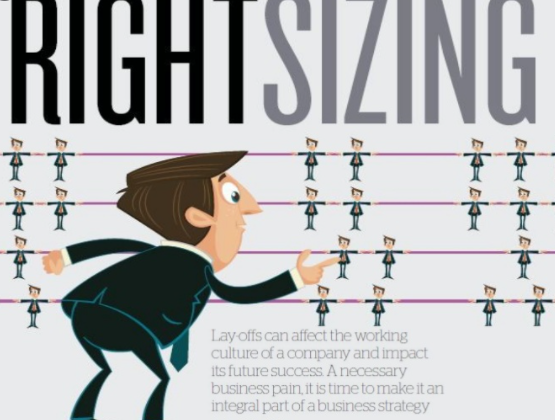Rightsizing Your Business During Tough Times

By James Pruitt, Senior Staff Writer
The pandemic’s disruption on the economy has been epic and continues. There are many businesses that are able not only to survive but can also thrive in such conditions. Others, not so much. Huge swaths of the economy are struggling. Unfortunately, downsizing is an unavoidable necessity for many small business owners.
Depending on the circumstances and nature of the recession, some businesses seem nearly recession-proof. Examples include essential services including the repair industry, online services, food and beverages, information technology, and health care. Such businesses tend to stand up to economic trauma.
Other companies, not so much. In this current recession, restaurants, entertainment venues, and luxury goods tend to wash out when consumers tighten their belts. As such, widespread downsizing is inevitable. Fortunately, there are right and wrong ways to downsize.
Below are some mistakes to avoid when rightsizing your business:
- Eliminating Entire Business Functions Unnecessarily:
Before eliminating an entire division or business function, consider the feasibility of across-the-board cuts. That function may well come in handy further down the line. Your business during tough times should become leaner and meaner, while remaining versatile. Use caution before eliminating an entire department or function. Even when the time comes to tighten your belt, a business should stay prepared for whatever challenge awaits and be prepared for the future.
- Failing to use Empathy with Staffing Changes:
When the time comes for layoffs, empathy and kindness counts a great deal. When laying off employees, do so with compassion, and consideration for overall circumstances. The same goes for schedule and salary changes. Downsizing mistakes can affect the employer’s relationship with his or her remaining workers. Any staffing agencies the business uses may also hesitate to work with such a business. Finally, wide repercussions can follow a reputation as a cruel employer. Makes sure you are following all applicable laws as well.
- Misreading Economic Circumstances:
An economic downturn is a good time for positive thinking. Employers in a recession need to get down to business. Plan for the worst-case scenario. Protect your bottom line, and ensure core operations are safe even as opportunities may drive up.
- Inventory Hoarding:
Inventory can be painful to lose, especially at less than its full value. However, inventory is also expensive to store and maintain. Business owners should liquidate when necessary and makes good business sense. Cash on-hand serves the company better than depreciating stock in the warehouse that is taking up space and perhaps expiring.
- Practice What You Preach:
Hardship is a two-way street in an economic downturn. Employers should demonstrate their own willingness to sacrifice. Concrete lifestyle changes show a spirit of togetherness against adverse circumstances. A recession is the wrong time for fancy vacations and glamorous purchases. You and your employees are in the same boat. Show it. You need to work together in order to come out in a positive way.
- How to Adapt to Rough Times:
Staying realistic can be a challenge when a business’s course takes a painful turn, especially with the current challenges from the pandemic. Sometimes, the best course is to sacrifice, and grin and bear it. An owner should keep the faith while rolling up his or her sleeves. The economy is cyclical, and circumstances will change. A recession is a time to weather the storm. Owners should understand that good proprietorship entails sucking up the bad with the good. Remember that even if the business fails, things will get better.
Even during these challenging times, it is important to stay positive and focused both personally and professionally. VAMBOA wishes you great success.
We hope that this article has been helpful. We work hard to bring you important, helpful and timely information and are the “go to” online venue for Veteran and Military Business Owners. VAMBOA, the Veteran and Military Business Owners Association is a non-profit trade association. We do not charge members any dues or fees and members can also use our seal on their collateral and website. If you are not yet a member, you can register here: https://vamboa.org/member-registration/
We also invite you to check us out on social media too.
Facebook: https://www.facebook.com/vamboa
Twitter: https://twitter.com/VAMBOA








